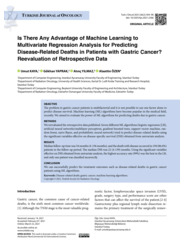Is There Any Advantage of Machine Learning to Multivariate Regression Analysis for Predicting Disease-Related Deaths in Patients with Gastric Cancer? Reevaluation of Retrospective Data
-
Yazar
Umut Kaya
-
Tür
Makale
- Yayın Yılı 2021
- Veritabanları Wos,Scopus,TR-Dizin
- DOI 10.5505/tjo.2021.2566
-
Yayıncı
Kare Publ
- Dergi Turk Onkoloji Dergisi-Turkish Journal Of Oncology 36, ( 2 ), pp.184 - 190
- Tek Biçim Adres https://hdl.handle.net/20.500.14081/1382
-
Konu Başlıkları
Disease-related death
Ggastric cancer
Machine learning algortihms
Turkish Society for Radiation Oncology
OBJECTIVE The problem in gastric cancer patients is multifactorial and it is not possible to use one factor alone to predict disease survival. Machine learning (ML) algorithms have become popular in the medical field, recently. We aimed to evaluate the power of ML algorithms for predicting deaths due to gastric cancer. METHODS We reevaluated the retrospective data published. Seven different ML algorithms (logistic regression [LR], artificial neural networks/multilayer perceptron, gradient boosted trees, support vector machine, random forest, naive Bayes, and probabilistic neural network) tried to predict disease-related deaths using the significant variables effective on disease-specific survival (DSS) obtained from univariate analysis. RESULTS Median follow-up time was 34 months (4-156 months), and the death with disease occurred in 194 (86.6) patients in the follow-up period. The median DSS was 22 (4-139) months. Using the significant variables effective on DSS obtained from univariate analysis, the highest accuracy rate (99) was the best in the LR, and only one patient was classified incorrectly. CONCLUSION We can successfully predict the treatment outcomes such as disease-related deaths in gastric cancer patients using ML algorithms.
-
Koleksiyonlar
Fakülteler
Mühendislik Fakültesi


 Tam Metin
Tam Metin

